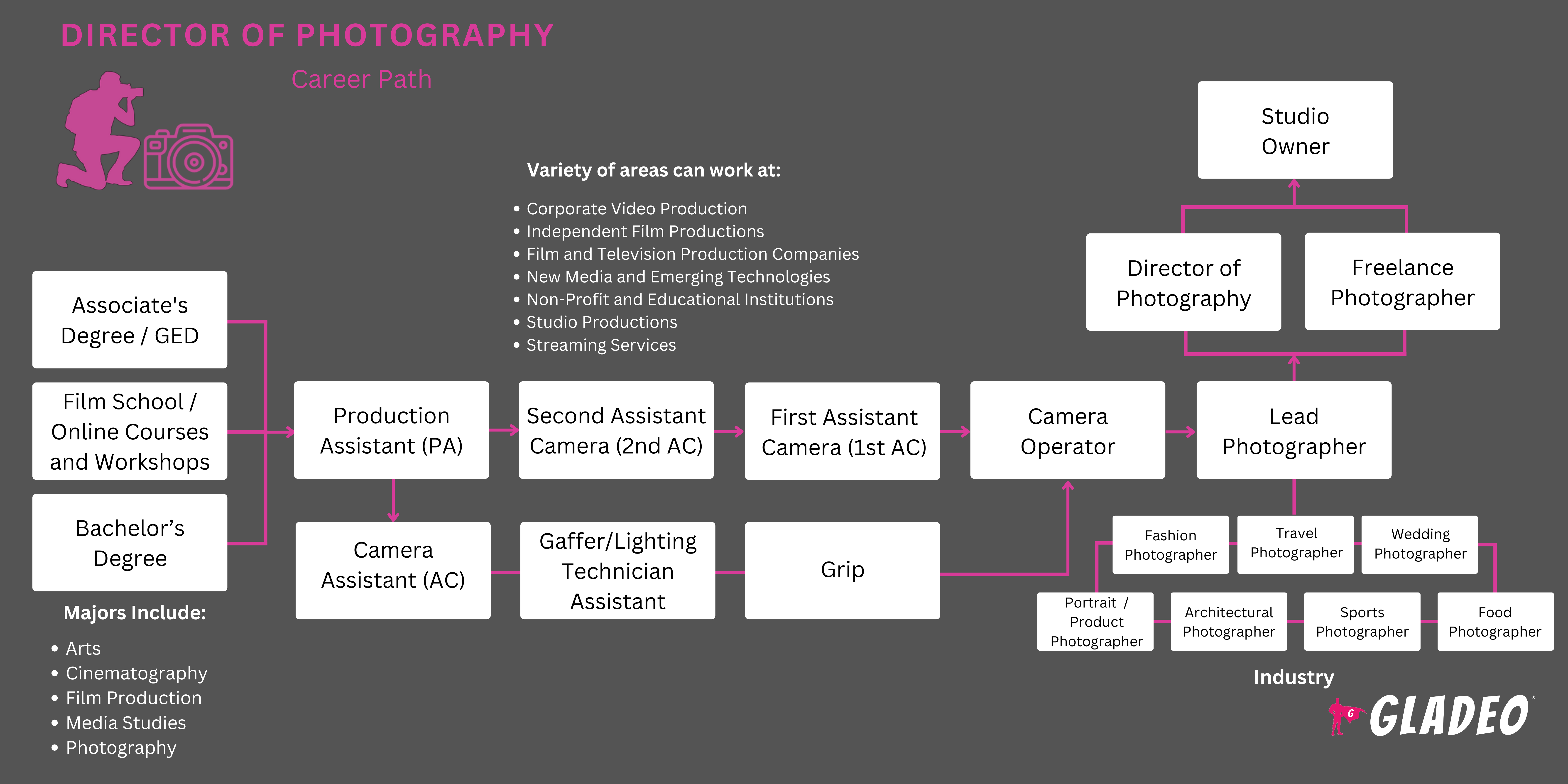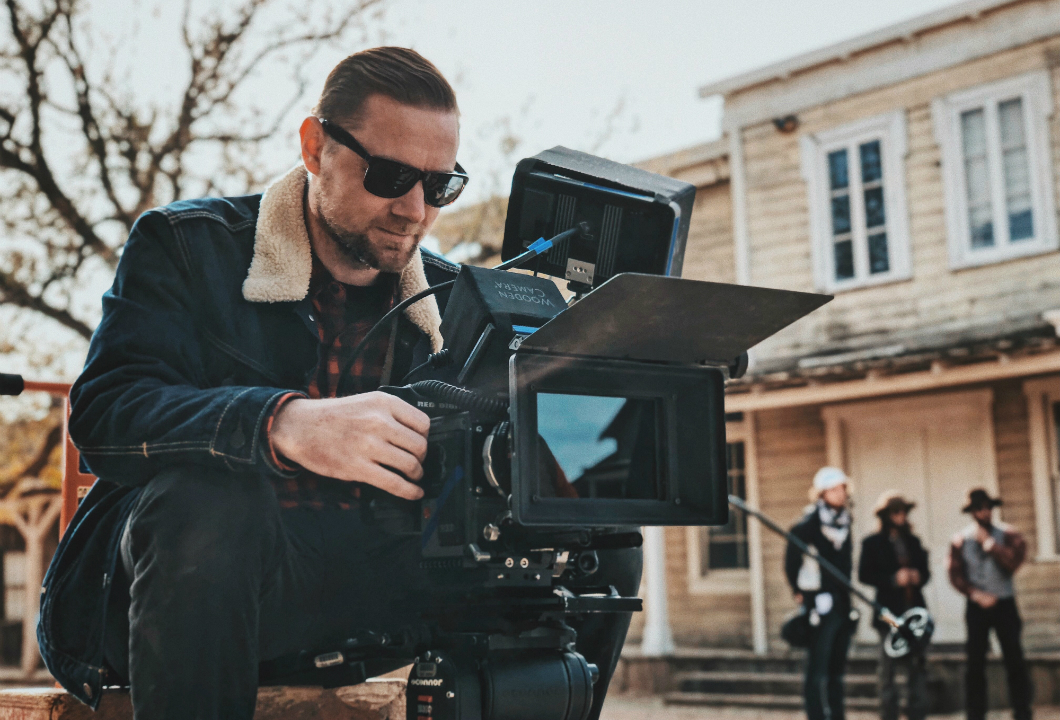Spotlights
- Director of Photography
- DP
- DoP
- Cinematographer
- Director of Cinematography
- Chief Cinematographer
A Director of Photography is the “second-in-command” on a production set underneath the Director, and tends to run the artistic and technical sides of the operation to fit the Director’s vision. The camera, lighting & electric and the grip (set-building) departments are all generally overseen by the Director of Photography, and prior to filming the job entails planning shots, visiting locations and ordering and testing equipment. After filming, a Director of Photography tends to review gathered footage with the Director.
“Getting paid to be a storyteller. Being an artist. Working in the film industry. Being in a creative field. Deciding what a film looks like, its visual aesthetic. Experimenting with new camera and lens technology. The feeling of watching a film, music video, commercial, etc, and thinking ‘Wow, I filmed that. It looks great.’ Solving different challenges, whether it's a tricky camera move or figuring out how to rig a light or hide it somewhere in the scene.” - Alexxiss Jackson
The specifics of what a Director of Photography does on a day-to-day basis can vary based on what medium they’re producing for.
“There isn't really a typical day, which is part of what I love about it. If a project is in pre-production, I may be reading a script, selecting which camera and lens package we're going to use, or even watching a movie that serves as a visual reference for the look the director wants to go for. If the project is in production, I'm on set. But that doesn't always look the same. In its most basic form, I am usually operating the camera on a production, whether it's a narrative film, documentary, commercial, music video, TV show segment, etc.” - Alexxis Jackson
- Communication Skills
- Time Management
- Leadership
- Coordination
- Active Learning
- Camera Operation
- IT Skills
- Critical, Artistic Vision
- Interpreting Scripts/Ideas from Director
Any camera-based production in the entertainment industry, including:
- Television
- Movies
- Commercials
- Documentaries
- Music Videos
- Constantly evolving technology, such as the development of 8K resolution cameras
- Productions with heavier reliance on visual effects
- Developing high definition, High Dynamic Range (HDR) programming
- Some productions shifting to a more online-focused, multimedia audience and style
- Watching lots of media content (movies, television, online videos, music videos, etc.)
- Also discussing that content with others, either from a fan perspective or a critical perspective to learn more about best practices
- Creating products for an online outlet such as YouTube or Instagram
- Directors of Photography (aka “DPs” or Cinematographers) usually hold a bachelor’s in a field such as Film and Television, photography, or similar studies
- Many film schools such as New York Film Academy offer short, intense cinematography training programs lasting a year or two, as well as offering a full degree programs
- Sample courses include:
- 35mm Cinematography
- Advanced Motion Picture Camera Technique
- Cinematography Production Lab
- Film Craft
- Fundamentals of Lighting
- Grip and Electric
- Optics of Lenses & Cameras
- Post-Production
- Production Design
- Production Workshops
- Stage Lighting Workshop
- Still Photography Workshop
- The Visual Screenplay
- Some Directors of Photography have years of experience working on film or television sets in other roles, including as interns, grips, electricians, or production assistants
- Directors of Photography should be familiar with a wide range of production types, from motion pictures and television shows to documentaries, music videos, commercials, and even print ads
- Stock up on courses in art, English, writing, design, and photography
- Join audiovisual clubs to get hands-on experience
- Watch a variety of production types, including films, TV shows, commercials, etc., and pay attention to how scenes are lit and how visual storytelling elements work
- Start making your short films for YouTube or Vimeo. Look for friends and community members who want to join your projects!
- Create a cinematographer’s reel to serve as your calling card. Post it online and keep your compilation footage updated as you improve your craft. Make sure you have rights in advance
- Borrow or rent video cameras, sound gear, and lighting equipment as you save up to buy your own kit
- Read about the key players you may interact with, such as directors, producers, actors, stunt people, crew members, and design teams
- Advertise your freelance DP services in the local area or online
- Attend film festivals and film school open events
- Keep honing your skills and reviewing changes in technology and techniques
- Network your tail off and try to make as many industry contacts as you can
- Apply for film internships until you land one!
- Study books, articles, and video tutorials (see our list of Resources > Websites)
- Interview a working Director of Photography or watch video interviews
- Work with independent filmmakers on smaller projects. Volunteer if they don’t have a budget to cover your salary!
- Join professional organizations to expand your network as you learn and build your reputation

- Working an internship, or becoming a production assistant on a project, is often the easiest way to get started
- Production assistants tend to have experiences across a set, with the camera, lighting and grip departments that are all overseen by a Director of Photography, giving an aspiring DP more knowledge of the entire process to use in a directorial role
- If you attend a film school, speak with your career center or program coordinators about how to connect with recruiters and companies
Join the International Cinematographers Guild when you’re eligible
Move to where the most movie and TV jobs are! Per BLS, the states with the highest employment for these film jobs are California, New York, Texas, Florida, and Georgia - Check out film job sites and forums as well as portals such as Indeed, Simply Hired, and Glassdoor
- Ask your professors, supervisors, and co-workers if they’ll serve as personal references
- Attend filmmaking events to gain exposure and meet new people
- Strong people skills and conscientious organization of a myriad of activities going on on-set with cameras, lighting, set direction, etc.
- Being able to work under pressure, with budget and time constraints depending on the project
- Particularly when those constraints intersect with environmental concerns like rain when shooting outdoors
- Willingness to travel for work, shooting on location or touring a finished product
- Working through long, irregular work weeks that often include evenings, weekends and holidays
- A strong artistic vision
- Working smaller jobs/internships producing the kind of content one is interested in can open opportunities to network
- Reaching out to individuals who work as DPs and asking questions
Organizations
Websites/Blogs
- Stephen Follows — Film Data and Education
- No Film School
- Advanced Filmmaking
- Ron Dexter, ASC
- Action-Cut-Print
- Adorama
- American Cinematographer
- American Film Institute
- American Society of Cinematographers
- Directors Guild of America
- Filmmaker Magazine
- Filmmakers Alliance
- Film Riot
- Film School Rejects
- Indie Film Hustle
- IndieWire
- International Cinematographers Guild Magazine
- Mandy.com
- MovieMaker Magazine
- National Association of Schools of Theatre
- National Endowment for the Arts
- REDUser
- SAGindie
- Script Magazine
- Student Filmmakers
- Studio Daily
- The Film Collaborative
- Women in Film (WIF)
Magazines
Resources
Film Schools
- American Film Institute
- Boston University College of Communication
- Chapman University’s Dodge College of Film and Media Arts
- Columbia University School of the Arts
- Florida State University College of Motion Picture Arts
- Full Sail University
- LA Film School
- Loyola Marymount University School of Film and Television
- Motion Picture Institute of Michigan
- New York Film Academy
- NYU/Tisch School of the Arts
- San Diego State University School of Theater, Television and Film
- Seattle Film Institute
- UCLA School of Theater, Film and Television
- UCLA Extension - Entertainment Studies
- USC School of Cinematic Arts
- University of New Orleans Film and Theatre
- University of Texas at Austin Department of Radio-Television-Film
Books
- Alternating between different entertainment mediums, possibly freelancing (for film, television, music videos, etc.)
- Possibly pivoting into other roles on a production set like acting, writing or editing
- Other on-air productions such as televised news
- Creating web series for oneself or a larger group on sites like YouTube
- Working for mediums such as animation or video game productions which still require knowledge of cinematography to compose shots
- Teaching in general education programs/film schools
- Creating videos/advertisements for local businesses, bands, artists, etc.
“Working in any creative field can be hard, because it’s not always as much of a straight line as ‘go to school, get this degree, get a job at this company.’ It takes a lot of hard work, a strong network and a lot of diligence. But if you can make it, you can spend your life doing something fun that you love.
Also, never stop learning. That’s a good practice in general, but especially for a career path like this where there is always new technology coming out.” - Alexxiss Jackson
Newsfeed

Featured Jobs

Online Courses and Tools







